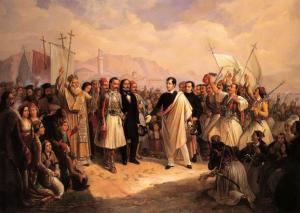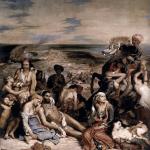 Lord Byron is a poet vaguely known, little read. He can teach all of us something, even if for your sins you never have to read his “classic” poem Don Juan.
Lord Byron is a poet vaguely known, little read. He can teach all of us something, even if for your sins you never have to read his “classic” poem Don Juan.
Byron himself was a terrible man, a human resource department disaster, with an ear for a jingle and a direct pipeline to the spirit of the age. As a result of his trendiness, he was an early social media star, forgiven for his vices, though like all such people, Byron was not built to endure. As he entered middle age, he was aged, health failing, the wages of continued sin bringing an imminent death. Like all of us, Byron was better than his worst moment, and thankfully better than his worst poetry.*
Like many greater men, he got many things wrong, but at the very end got the biggest thing right. As he was sinking into degenerate death, he was roused by the bravery of the Greeks. His classical Christian education had been a gift of Greece and through the drugs and wine he could recollect this fact. All the morals he flaunted, all the culture he loved, they all found a root in Greece. Lord Byron had sense, perhaps for the first time, to know his debt.
He managed to go to Greece with money to support the War of Independence. He spent a good bit of money, took personal risk. He went from place to place and was honored. None of the money he spent directly led to victory. He won no battles. He died of natural causes in Missolonghi, right before Missolonghi became famous for courage resisting tyranny.
Fools think Lord Byron failed.
The lovers of wisdom know that Byron redeemed his useless life. He was famous, an icon to the outside world, and so his going to Greece, commitment to democracy, death in Greece was an image of a deep reality. Lord Byron used his fame, gained partly by his vile life, to support better men. He went to Greece, lived and died for the liberty of the Greeks, and so ended his life better than he had lived his life.
Consider Byron: famous for decadence. Consider Greece: famous for what she had been, brutalized by tyrants. Lord Byron grasped the debt he owed Hellas, Greece. He knew that there would be no science, certainly no Western poetry, if there had not been Socrates, Plato, Constantine, Basil, Justinian. He came to Greece to pay his debt to Greece and was an image to Western Europe. His death was, sadly, more valuable than his life. Western Europeans were reminded of the debt they owed to Greece.
Lord Byron was a symbol of the sort that is more valuable than the “facts” on the ground. Like some earlier John Wayne who was not himself a hero, but came to represent true heroism by his art, Lord Byron became a folk hero for what he aspired to do rather than what he did. Lord Byron found redemption in his opposition to Ottoman tyranny, as Wayne found a cause in opposing Soviet tyranny.
Byron died better than he lived. He died in Missolonghi. . . a town that was about to become famous.
As to Missolonghi, the Alamo of Hellas**, that is another tale.
Awake! (not Greece -she is awake!)
Awake, my spirit! Think through whom
Thy life-blood tracks its parent lake,
And then strike home!Tread those reviving passions down,
Unworthy manhood! -unto thee
Indifferent should the smile or frown
Of beauty be.If thou regret’st thy youth, why live?
The land of honourable death
Is here: -up to the field, and give
Away thy breath!Seek out -less often sought than found –
A soldier’s grave, for thee the best;
Then look around, and choose thy ground,
And take thy rest.
*And of course Byron could write a great poem. . . his worst better than my best, but he was up-to-date to the point of being hopelessly dated.
**Really the Alamo is the Missolonghi of America.












